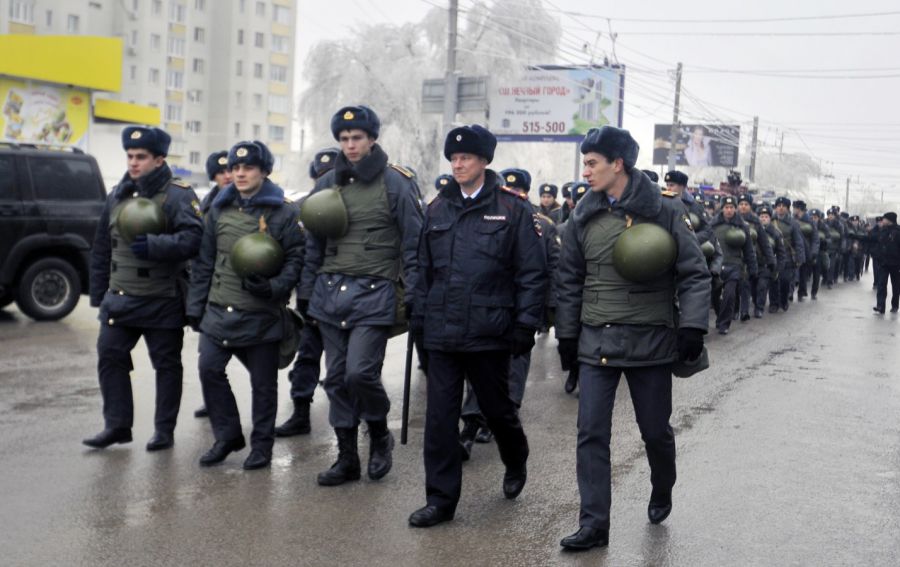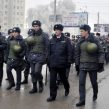
Perceived Imminent Terrorist Threat in Russia Triggers Unprecedented Security Clampdown
Publication: Eurasia Daily Monitor Volume: 11 Issue: 4
By:

Two terrorist suicide bomb explosions in Volgograd (former Stalingrad)—on December 29 in the main city railroad station, and on December 30 on a packed city trolleybus—killed 34 people and injured more than 60. Russian officials believe the attacks were perpetrated by North Caucasian–based Salafi jihadist militants that are fighting a seemingly endless bloody insurgency war against Russian federal authorities and their local supporters. Russian security officials said they had determined that the two Volgograd suicide bombers arrived in the city “from the Northern Caucasus, determined to cause carnage and panic.” The two bombers could have been Slavic converts to Salafi Islam (https://www.interfax.ru/print.asp?sec=1448&id=350031).
Dagestan and other North Caucasian provinces are the scene of constant rebel-organized explosions, shootings and reprisal attacks by Russian security forces. This nonstop North Caucasian bloody carnage has more or less ceased to be a prime news item in Russia, seen more like something happening in a distant foreign country. The twin attacks and carnage in Volgograd, which followed a previous suicide bombing of a passenger bus in the same city last October (killing 6 and injuring more than 30) has rekindled the fear of a terrorist threat among the general Russian public. Last July, Chechen rebel Doku Umarov, the leader of the so-called Imarat Caucas (Caucasus Emirate), in an internet-posted video address called on insurgents to attack Russian civilian targets outside the North Caucasian region that were off limits according to his previous orders. Umarov commanded them to undermine the Winter Olympics in Sochi and to revenge the suppression of the jihadist underground in the North Caucasus (https://www.newsru.com/russia/03jul2013/umarov_sochi.html). The double attacks in Volgograd are seen in Russia as a beginning of a possible sustained wave of terrorism aimed at hindering the coming Sochi Games. As Russia emerges from its prolonged New Year and Orthodox Christmas holidays, the authorities are imposing draconian security measures, effectively putting the nation in a state of siege.
Beginning January 7 until March 21, Sochi is to be isolated from the outside world by security barriers and divided into additional internal security zones, severely restricting the movement of people and vehicles. Over 30,000 police, security and military personnel will be deployed in Sochi, and this siege state will cover the run-up to the Winter Olympics, the games themselves (February 7–23), the following Paralympics (March 7–16) all through March 21 (https://www.interfax.ru/print.asp?sec=1448&id=350361). During the winter and early spring, it is possible to effectively bottle up Sochi by controlling the airport, the seafront and the narrow costal approaches from the south and north as the mountains in the hinterland are impassable. But the twin bombings in Volgograd demonstrated that keeping Sochi secure by concentrating security resources in one place leaves other big Russian cities vulnerable.
This week (January 8), the Russian civil aviation watchdog Rosavatsya imposed draconian blanket restrictions on any amount of any liquid or semi-liquid substances to be in any carryon luggage on any flights in any Russian airport, citing “the continuing threat of terrorist attacks using explosive devices.” Rosavatsya believes that passenger planes are especially vulnerable, “because they carry the colors and registration of the Russian Federation.” In effect, any amount of toothpaste (even a tenth of an ounce), or lotion, or shaving gel, or perfume are forbidden in carryon luggage. Liquid medications and infant food and drink may pass, but they must be officially documented as essentially needed during flight. Moreover, these liquids must be tested each time by authorities to verify their safety, which in the case of substances that must stay sterile like, say, insulin injections, seems unachievable. Rosavatsya states the increased security measures “are temporary,” but does not give any indication when they will be eased (https://www.interfax.ru/russia/txt/350483).
The security clampdown by Rosavatsya will in effect forbid air travel with only carryon luggage, forcing all passengers to check baggage, which in the case of low-cost airlines requires an additional fee. Russian aviation experts believe the stepped-up Rosavatsya security restrictions are too excessive and mostly pointless—it is difficult to imagine how several grams of toothpaste or perfume may threaten an airplane. Rosavatsya seems to be in a state of panicked bureaucratic overreaction that will hurt the general public, which the terrorists may consider an important achievement in itself (https://ria.ru/society/20140109/988375034.html).
It seems the Russian security services lack credible inside intelligence information about the plans and actions of the North Caucasian–based Salafi jihadist militants. The Russian Federal Security Service (FSB) seems to lack the technical capabilities of the United States’ National Security Agency, as revealed by former spy contractor Edward Snowden—though Russian law and legal practice allows the FSB to intercept, listen and record anything it wishes. Planting or recruiting effective informers within terrorist networks of ideologically determined fighters is an uphill task for the world’s best security organizations, so the Russian authorities are reacting to the Volgograd attacks and the perceived Olympics-connected terrorist threat by beating about the bush in panic and with an overwhelming security clampdown of questionable effectiveness. After the first Volgograd railroad station explosion on December 29, overall security in Volgograd was drastically increased, police and security personnel mobilized, as well as security patrols increased, but this did not stop the second deadly attack on December 30, by evidently the same terrorist cell that was apparently deployed in the city beforehand (https://www.interfax.ru/print.asp?sec=1448&id=349601).
As Russia returns next week to “business as usual” following the prolonged holiday season, public transit in Moscow and other major cities will again be packed with people However, the authorities do not seem to know for sure if terrorist attack cells are already deployed—and where or when. The kneejerk reaction of the corrupt and inefficient Russian bureaucracy (including the security services) will most likely be the same as that of Rosavatsya. One can expect a senselessly draconian overall security clampdown aimed not so much at actually stopping a terrorist attack, but more to serve as an alibi for the Kremlin if an attack happens: that the departments were working overtime and taking serious measures in advance.




